 Petzlover
Petzlover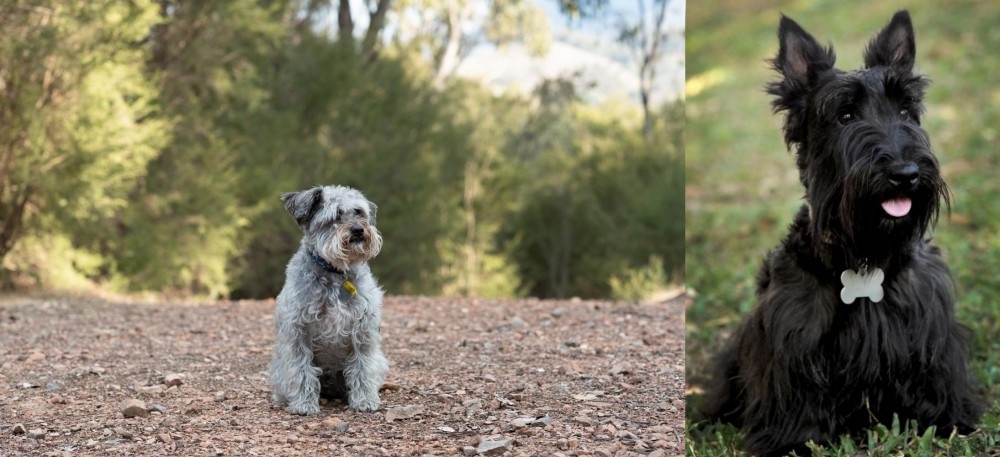 Schnoodle is originated from United States but Scoland Terrier is originated from United Kingdom. Schnoodle may grow 39 cm / 16 inches higher than Scoland Terrier. Schnoodle may weigh 35 kg / 78 pounds more than Scoland Terrier. Both Schnoodle and Scoland Terrier has almost same life span. Both Schnoodle and Scoland Terrier has almost same litter size. Schnoodle requires Moderate Maintenance. But Scoland Terrier requires High Maintenance
Schnoodle is originated from United States but Scoland Terrier is originated from United Kingdom. Schnoodle may grow 39 cm / 16 inches higher than Scoland Terrier. Schnoodle may weigh 35 kg / 78 pounds more than Scoland Terrier. Both Schnoodle and Scoland Terrier has almost same life span. Both Schnoodle and Scoland Terrier has almost same litter size. Schnoodle requires Moderate Maintenance. But Scoland Terrier requires High Maintenance
 The Schnoodle was developed in the 1980s. It is believed the dog originates from the USA. This was when it was discovered that breeding the poodle with other dogs produced excellent mixes.
The Schnoodle was developed in the 1980s. It is believed the dog originates from the USA. This was when it was discovered that breeding the poodle with other dogs produced excellent mixes.
The idea with the Schnoodle was to develop a low-shedding dog. The Schnoodle is a mix between a Schnauzer and a Poodle,but because both the Poodle ad Schnauzer have different sizes, there is no knowing what size the Schnoodle will be.
Major kennels don’t recognize the Schnoodle as a breed.
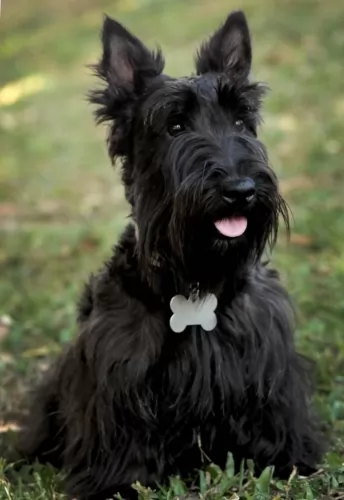 Not much is known about the Scoland Terrier. It is not a purebred but rather a crossbreed developed by crossing the Scottish Terrier with the Westland Terrier. To understand these mixed breeds, look to the original breeds for any combination of the characteristics of the breeds. The offspring of this crossing is not a 50-50 split of the original breeds looks or temperament.
Not much is known about the Scoland Terrier. It is not a purebred but rather a crossbreed developed by crossing the Scottish Terrier with the Westland Terrier. To understand these mixed breeds, look to the original breeds for any combination of the characteristics of the breeds. The offspring of this crossing is not a 50-50 split of the original breeds looks or temperament.
Because the Scoland Terrier is a mix between the Scottie and the Westie he has all the characteristics of a typical terrier perhaps even twice as much. With both parents being terriers, you can expect your Scoland to act like a short legged terrier. These dogs are known for their courage and tenacity. Today these terriers are family companions. Most terriers today come from a pool of ancestral dog in the 19th century in Europe. This information was gleaned from a genetic analysis done in 2006.
The Scoland Terrier, being a hybrid, is not acknowledged by the American Kennel Club (AKC) or the United Kennel Club (UKC). It is acknowledged by the International Designer Canine Registry (IDCR), American Canine Hybrid Club (ACHC), Dog Registry of America, Inc. (DRA), Designer Dogs Kennel Club (DDKC) and Designer Breed Registry (DBR).
 The Schnoodle is a cross between a poodle and a schnauzer and with the poodle parent in the mix, the dog is considered to be hypoallergenic.
The Schnoodle is a cross between a poodle and a schnauzer and with the poodle parent in the mix, the dog is considered to be hypoallergenic.
Because there are three sizes of Schnauzer, the Schnoodle can be medium sized but also fairly large. Weight of this dog can be anything from 6 to 45 Kg and he can stand at between 38cm to 66cm. The coat can be either wavy, straight or curly and will need to be brushed, stripped or clipped according to the coat they have.
The most common coat colors are grey, a mix of grey, silver and white, a fawn or creamish color and black. The medium sized ears are floppy.
Because this is a mixed breed you won’t get a fixed personality type and you won't find fixed looks. Because the dog comes from two excellent parent breeds, you can expect your schnoodle to be friendly, alert and very active.
They may not take readily to kids so it is up to the human owners to see that their children are brought up to be kind and respectful to dogs and animals. Your Schnoodle can be gentle too and stubborn but he will bond closely with his human family.
The smallish size of these dogs makes it a good choice for city or country life, but wherever he is, he will need lots of exercise. Schnoodles are smart and respond well to training.
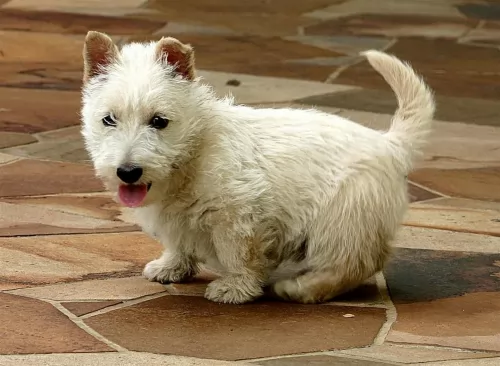 Being a hybrid, the Scoland Terrier will not always look alike and could look like a Scottie, a Westie or a combination of the two. Most breeders of this designer dog say it usually has a body like the Scottie and a round head like the Westie. They are more often black with white markings, but they can often be wheaten as well. With round dark eyes, a scissors bite and black nose, her face is unique. The breed has erect and small, triangular ears and a medium fluffy tale. The coat is hard and wiry, with a dense soft undercoat.
Being a hybrid, the Scoland Terrier will not always look alike and could look like a Scottie, a Westie or a combination of the two. Most breeders of this designer dog say it usually has a body like the Scottie and a round head like the Westie. They are more often black with white markings, but they can often be wheaten as well. With round dark eyes, a scissors bite and black nose, her face is unique. The breed has erect and small, triangular ears and a medium fluffy tale. The coat is hard and wiry, with a dense soft undercoat.
 Thanks to their parents, Schnauzer cross Poodles are smart, easy to train and fast learners.
Thanks to their parents, Schnauzer cross Poodles are smart, easy to train and fast learners.
Schnoodles are also fun-loving dogs, and they make great playmates for children. They are also a good choice for first time dog owners. A bonus part for dog owners is that these dogs are low shedding, making them great for anyone who suffers from allergies.
The Schnoodle forms strong bonds with their human family and this makes them both protector and watchdog. He is a great family dog with some excellent characteristics from each of the parent dog breeds involved.
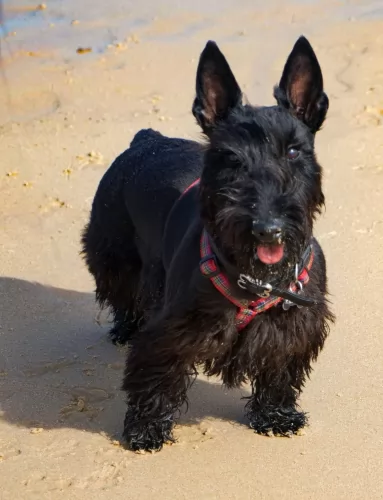 1.Children friendliness - they can be very good with children and children can help them get their exercise.
1.Children friendliness - they can be very good with children and children can help them get their exercise.
3.Adaptability - yes but she is adept at digging and must have a safe enclosure.
 The Schnoodle is a robust, healthy breed, but unfortunately he can also succumb to any one of the many dog illnesses there are -
The Schnoodle is a robust, healthy breed, but unfortunately he can also succumb to any one of the many dog illnesses there are -
This refers to an eye disease which results in the deterioration of the retina. Your dog develops night blindness and this can lead to total blindness. Unfortunately there is no cure.
It can be horrible seeing your pet jerking and twisting out of control with seizures. You will need to get your pet to the vet as epilepsy can be a symptom of a bigger issue.
This is a life threatening disease where your dog’s stomach fills with gas and becomes hard and swollen. The stomach can twist. Symptoms of bloat include restlessness, drooling and trying to vomit.
 This hybrid dog can inherit any of the issues faced by its two parent breeds. For the Scoland Terrier this can include:
This hybrid dog can inherit any of the issues faced by its two parent breeds. For the Scoland Terrier this can include:
• Seborrhea – Skin disease that can cause dogs to scratch until bleeding and/or infected.
• Carniomandibular Osteopathy -called lion’s jaw this is a developmental disease that causes extensive changes in the bones of the mandible and skull.
• Pulmonic Stenosis – when the blood flowing from the heart’s right ventricul to the pulmonary artery is blocked.
• PPM or Persistent Pupillary Membranes - causes visual impairment when the membranes do not dissolve after birth.
• Chronic Hepatitis – disease of the liver that can eventually cause major damage.
 The Schnoodle is a dog that will need a good dose of exercise. Provide him with daily walks, walks in the park, hikes, runs along the beach as well as ball and rope games.
The Schnoodle is a dog that will need a good dose of exercise. Provide him with daily walks, walks in the park, hikes, runs along the beach as well as ball and rope games.
Always try to feed your dog a high quality food. Many people give their dogs one of the commercially manufactured foods there are because they are wonderfully convenient, and you get some good ones.
You don’t want to give this food to your dog day after day after day. Feed him some home-made food occasionally which can be added to his dry kibble twice a week. Boiled chicken, brown rice or pasta and spinach, sweet potatoes and carrots are a healthy choice for your pet.
You can boil it, chop it all up and add smaller portions to the dry kibble twice a week as a wonderful, tasty treat for your dogs.
Try and include some raw meat into the diet as this can help to fight of skin diseases. Ensure there is always a bowl of fresh, cool water for him.
Make sure all the necessary vaccines are up to date to avoid some of the deadly canine diseases there are.
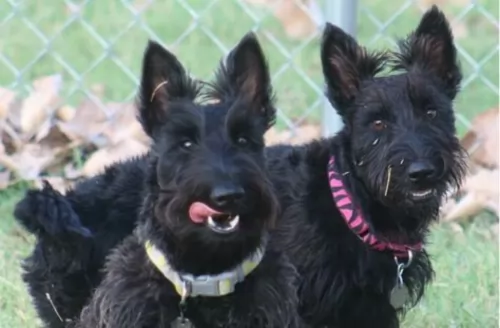 1.Feeding the puppy - Give a high quality puppy dog food designed for terriers or active medium sized dogs. Give ¾ of a cup over 3 meals a day.
1.Feeding the puppy - Give a high quality puppy dog food designed for terriers or active medium sized dogs. Give ¾ of a cup over 3 meals a day.
2.Feeding the adult – Give a high quality adult dog food designed for terriers or active medium sized dogs. Give one cup over two meals a day.
4. Games and Exercises – The Scoland Terrier is a very active dog and needs daily exercise, He need time to play, run, and be stimulated by games. She would be very good at flyball, Frisbee, fetch, agility, barn hunt, and obedience. He needs at least 2 hours of play and exercise everyday.